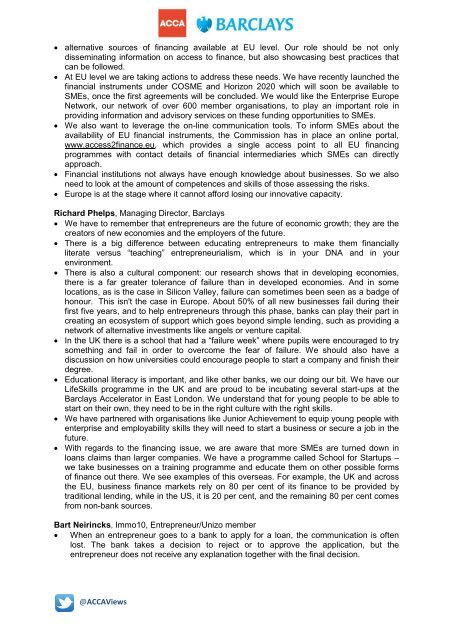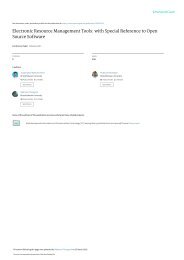Research Article for study 722
You also want an ePaper? Increase the reach of your titles
YUMPU automatically turns print PDFs into web optimized ePapers that Google loves.
alternative sources of financing available at EU level. Our role should be not only<br />
disseminating in<strong>for</strong>mation on access to finance, but also showcasing best practices that<br />
can be followed.<br />
At EU level we are taking actions to address these needs. We have recently launched the<br />
financial instruments under COSME and Horizon 2020 which will soon be available to<br />
SMEs, once the first agreements will be concluded. We would like the Enterprise Europe<br />
Network, our network of over 600 member organisations, to play an important role in<br />
providing in<strong>for</strong>mation and advisory services on these funding opportunities to SMEs.<br />
We also want to leverage the on-line communication tools. To in<strong>for</strong>m SMEs about the<br />
availability of EU financial instruments, the Commission has in place an online portal,<br />
www.access2finance.eu, which provides a single access point to all EU financing<br />
programmes with contact details of financial intermediaries which SMEs can directly<br />
approach.<br />
Financial institutions not always have enough knowledge about businesses. So we also<br />
need to look at the amount of competences and skills of those assessing the risks.<br />
Europe is at the stage where it cannot af<strong>for</strong>d losing our innovative capacity.<br />
Richard Phelps, Managing Director, Barclays<br />
We have to remember that entrepreneurs are the future of economic growth; they are the<br />
creators of new economies and the employers of the future.<br />
There is a big difference between educating entrepreneurs to make them financially<br />
literate versus “teaching” entrepreneurialism, which is in your DNA and in your<br />
environment.<br />
There is also a cultural component: our research shows that in developing economies,<br />
there is a far greater tolerance of failure than in developed economies. And in some<br />
locations, as is the case in Silicon Valley, failure can sometimes been seen as a badge of<br />
honour. This isn't the case in Europe. About 50% of all new businesses fail during their<br />
first five years, and to help entrepreneurs through this phase, banks can play their part in<br />
creating an ecosystem of support which goes beyond simple lending, such as providing a<br />
network of alternative investments like angels or venture capital.<br />
In the UK there is a school that had a “failure week” where pupils were encouraged to try<br />
something and fail in order to overcome the fear of failure. We should also have a<br />
discussion on how universities could encourage people to start a company and finish their<br />
degree.<br />
Educational literacy is important, and like other banks, we our doing our bit. We have our<br />
LifeSkills programme in the UK and are proud to be incubating several start-ups at the<br />
Barclays Accelerator in East London. We understand that <strong>for</strong> young people to be able to<br />
start on their own, they need to be in the right culture with the right skills.<br />
We have partnered with organisations like Junior Achievement to equip young people with<br />
enterprise and employability skills they will need to start a business or secure a job in the<br />
future.<br />
With regards to the financing issue, we are aware that more SMEs are turned down in<br />
loans claims than larger companies. We have a programme called School <strong>for</strong> Startups –<br />
we take businesses on a training programme and educate them on other possible <strong>for</strong>ms<br />
of finance out there. We see examples of this overseas. For example, the UK and across<br />
the EU, business finance markets rely on 80 per cent of its finance to be provided by<br />
traditional lending, while in the US, it is 20 per cent, and the remaining 80 per cent comes<br />
from non-bank sources.<br />
Bart Neirincks, Immo10, Entrepreneur/Unizo member<br />
When an entrepreneur goes to a bank to apply <strong>for</strong> a loan, the communication is often<br />
lost. The bank takes a decision to reject or to approve the application, but the<br />
entrepreneur does not receive any explanation together with the final decision.<br />
@ACCAViews





